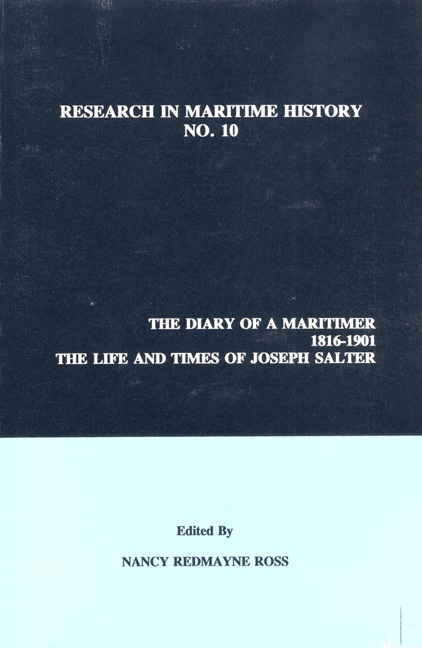Book contents
- Frontmatter
- Contents
- Foreword
- Introduction
- List of Illustrations
- Chapter 1
- Chapter 2
- Chapter 3
- Chapter 4
- Chapter 5
- Chapter 6
- Chapter 7
- Chapter 8
- Chapter 9
- Chapter 10
- Chapter 11
- Chapter 12
- Chapter 13
- Chapter 14
- Chapter 15
- Chapter 16
- Appendix 1 Vessels Owned by G. & J. Salter, 1852-1857
- Appendix 2 Patent Application, 1867
- Appendix 3 Genealogy
- Appendix 4 A Brief History of the Shipyard of G. & J. Salter
Introduction
- Frontmatter
- Contents
- Foreword
- Introduction
- List of Illustrations
- Chapter 1
- Chapter 2
- Chapter 3
- Chapter 4
- Chapter 5
- Chapter 6
- Chapter 7
- Chapter 8
- Chapter 9
- Chapter 10
- Chapter 11
- Chapter 12
- Chapter 13
- Chapter 14
- Chapter 15
- Chapter 16
- Appendix 1 Vessels Owned by G. & J. Salter, 1852-1857
- Appendix 2 Patent Application, 1867
- Appendix 3 Genealogy
- Appendix 4 A Brief History of the Shipyard of G. & J. Salter
Summary
Homo sum humará nihil a me alienum puto. (I am a man, nothing that relates to man do I deem alien to me.)
January 1st, 1837. Here we are - rolling, pitching, sails slapping, rudder creaking - in a stark calm in which most lovely of all lovely positions have we been during the last four or five days. There, roll again; but her rolling shall not prevent me from effecting a resolution I made some days since, of keeping a memo from the first of 1837.
With these words Joseph Salter began a diary which he was to keep intermittently until February 1899. His diary starts on a voyage home from Falmouth, Jamaica, bound for New York in the Brig George Henry. He was six months short of his twenty-first birthday and - on his second voyage - already one-third owner of the ship, a seasoned sailor, an entrepreneur.
The writing continues for years, on pages often left with wide margins. It stops, goes on again at intervals - sometimes in diary form, sometimes a digression on his earlier days. He returns to fill those wide margins with his recollections, anecdotes, remembered details. In trying to put together the life of Joseph Salter as recorded in the journals, I have taken the liberty of arranging these entries in a sequence that puts events in chronological perspective, including his memo of the earliest voyage of 1836, which he had kept in pencil at the time. I have retained words that were in use at the time though they are now considered archaic.
As great grandchildren of Joseph Salter, my husband and I inherited his diaries and scrapbooks. Later, in closing out a family estate in North Sydney I found a collection of old letters and papers about Salter's life in Moncton. This glimpse into the past seemed worth putting together in book form.
But during the Moncton years, Salter did not keep up his journal, so I have drawn on other sources for that period. The most important of these sources was the collection of shipping letters which were donated to the Moncton Museum by Joseph Salter of Sydney Mines, who inherited them from his grandfather of the same name.
- Type
- Chapter
- Information
- The Diary of a Maritimer, 1816–1901The Life and Times of Joseph Salter, pp. ix - xPublisher: Liverpool University PressPrint publication year: 1996

